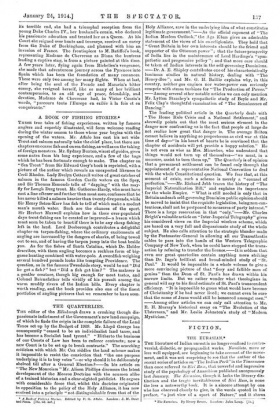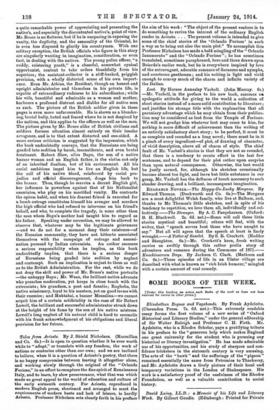FICTION.
THE EURASIAN.'
THE literature of Indian unrest is no longer confined to contra. versial, didactic, or propagandist works. Novelists, more or less well equipped, are beginning to take account of the move. meet, and it was not surprising to see that tho author of the recent series of articles on "The Indian Peril "in the Times more than once referred to Biti Ram, that powerful and impressive study of the psychology of Anarchism pnblislied anonymously last January. The Eut (mitts, though it lacks the literary dia. Unction and the tragic inevitableness of Sin i Bast, is none the less a noteworthy book. It is a sincere attempt by one who has observed closely to give, in the words quoted in his preface, "a just view of a. sport of Nature," and it shows • Vie Extesian. By Henry Brace. Loudon: Jobs Long. [Cs.] a quite remarkable power of appreciating and presenting the native's, and especially the discontented native's, point of view. Mr. Bruce is no flatterer, but if he is unsparing in exposing the vanity, the duplicity, and the sensuality of the Oriental, he is even less disposed to glorify his countrymen. With one solitary exception, the British officials who figure in this story are singularly wanting in imagination, consideration, or even tact, in dealing with the natives. The young police officer, "a ruddy, roistering youth," is a cheerful, somewhat cynical opportunist, content to take orders thankfully from hie superiors; the assistant-collector is a stiff-backed, priggish precisian, with a wholly distorted sense of his own import. canoe. Even Mr. Atkins, the Resident, though an honest and upright administrator and blameless in his private life, is capable of extraordinary rudeness to his subordinates ; while his wife, beautiful and admirable as a woman and mother, harbours a profound distrust and dislike for all native men as such. The picture of the British soldier given in these pages is even more unfavourable. He is shown as a blunder- ing, brutal bully, hated and feared where he is not despised by the natives, and this applies to the officers as well as the men. The picture given by Mr. Bruce alike of British civilians and soldiers focuses attention almost entirely on their insular arrogance, and is to that extent distorted and one-sided. A more serious critieism is suggested by the impression, which the book undoubtedly conveys, that the Eurasians are being goaded into sedition by harsh, inconsiderate, and even brutal treatment. Robert Slow, alias Bapu, the son of a native bazaar woman and an English father, is the victim not only of an inherited dualism, but of his environment. All his social ambitions impel him to live an English life, but the call of his native blood, reinforced by racial pre- judice and official discouragement, drags him back to the bazaar. Thus, though he marries a decent English girl, her influence is powerless against that of his Nationalist associates, who play on his mortified vanity. He contracts the opium habit, and when his dearest friend is executed for a bomb outrage constitutes himself his avenger and murders the high official who had refused to intervene on his friend's behalf, and who, to complete the tragedy, is none other than the man whom Bapu's mother had taught him to regard as his father. Speaking under correction, we may be allowed to observe that, whatever may be the legitimate grievances —and we do not for a moment deny their existence—of the Eurasian community, they have not hitherto associated themselves with the campaign of outrage and assassi- nation pursued by Indian extremists. An author assumes a serious responsibility when he implies, as this book undoubtedly implies, that there its a serious danger of Eurasians being goaded into sedition by neglect and contempt. Such an implication is unjust to them as well as to the British Administration. For the rest, while we do not deny the skill and power of Mr. Bruce's native portraits —the unhappy Bapu ; Mr. Wasn, the brilliant native advocate who preaches moderation, yet keeps in close touch with the extremists ; his grandson, a poet and fanatic; Raghoba, the native missionary, loyal to his masters, yet on good terms with their enemies ; and Muktabai, a bazaar lffessalina—we cannot acquit him of a certain artificiality in the case of Sir Robert Lowell, the brilliant and successful administrator struck down at the height of his fame by the son of his native mistress. Lowell's long neglect of his natural child is hard to reconcile with his frank acknowledgment of his obligations and liberal provision for her future.







































 Previous page
Previous page